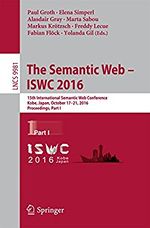Proceedings of the 15th International Semantic Web Conference (ISWC 2016), Part I
Aus International Center for Computational Logic
Proceedings of the 15th International Semantic Web Conference (ISWC 2016), Part I
Paul T. GrothPaul T. Groth, Elena SimperlElena Simperl, Alasdair J. G. GrayAlasdair J. G. Gray, Marta SabouMarta Sabou, Markus KrötzschMarkus Krötzsch, Freddy LécuéFreddy Lécué, Fabian FlöckFabian Flöck, Yolanda GilYolanda Gil
Paul T. Groth, Elena Simperl, Alasdair J. G. Gray, Marta Sabou, Markus Krötzsch, Freddy Lécué, Fabian Flöck, Yolanda Gil
Proceedings of the 15th International Semantic Web Conference (ISWC 2016), Part I
Volume 9981 of LNCS, 2016. Springer
Proceedings of the 15th International Semantic Web Conference (ISWC 2016), Part I
Volume 9981 of LNCS, 2016. Springer
- KurzfassungAbstract
The two-volume set LNCS 9981 and 9982 constitutes the refereed proceedings of the 15th International Semantic Web Conference, ISWC 2016, which was held in Kobe, Japan, in October 2016. The 75 full papers presented in these proceedings were carefully reviewed and selected from 326 submissions.The International Semantic Web Conference is the premier forum for Semantic Web research, where cutting edge scientific results and technological innovations are presented, where problems and solutions are discussed, and where the future of this vision is being developed. It brings together specialists in fields such as artificial intelligence, databases, social networks, distributed computing, Web engineering, information systems, human-computer interaction, natural language processing, and the social sciences.
The Research Track solicited novel and significant research contributions addressing theoretical, analytical, empirical, and practical aspects of the Semantic Web. The Applications Track solicited submissions exploring the benefits and challenges of applying semantic technologies in concrete, practical applications, in contexts ranging from industry to government and science. The newly introduced Resources Track sought submissions providing a concise and clear description of a resource and its (expected) usage. Traditional resources include ontologies, vocabularies, datasets, benchmarks and replication studies, services and software. Besides more established types of resources, the track solicited submissions of new types of resources such as ontology design patterns, crowdsourcing task designs, workflows, methodologies, and protocols and measures. - Projekt:Project: Cfaed, DIAMOND, HAEC B08
- Forschungsgruppe:Research Group: Wissensbasierte SystemeKnowledge-Based Systems
@proceedings{ISWC2016-part1,
editor = {Groth Paul T. and Elena Simperl and Alasdair J. G. Gray and Marta
Sabou and Markus Kr{\"{o}}tzsch and Freddy L{\'{e}}cu{\'{e}} and
Fabian Fl{\"{o}}ck and Yolanda Gil},
title = {Proceedings of the 15th International Semantic Web Conference
(ISWC 2016), Part I},
series = {LNCS},
volume = {9981},
publisher = {Springer},
year = {2016},
doi = {10.1007/978-3-319-46523-4}
}
